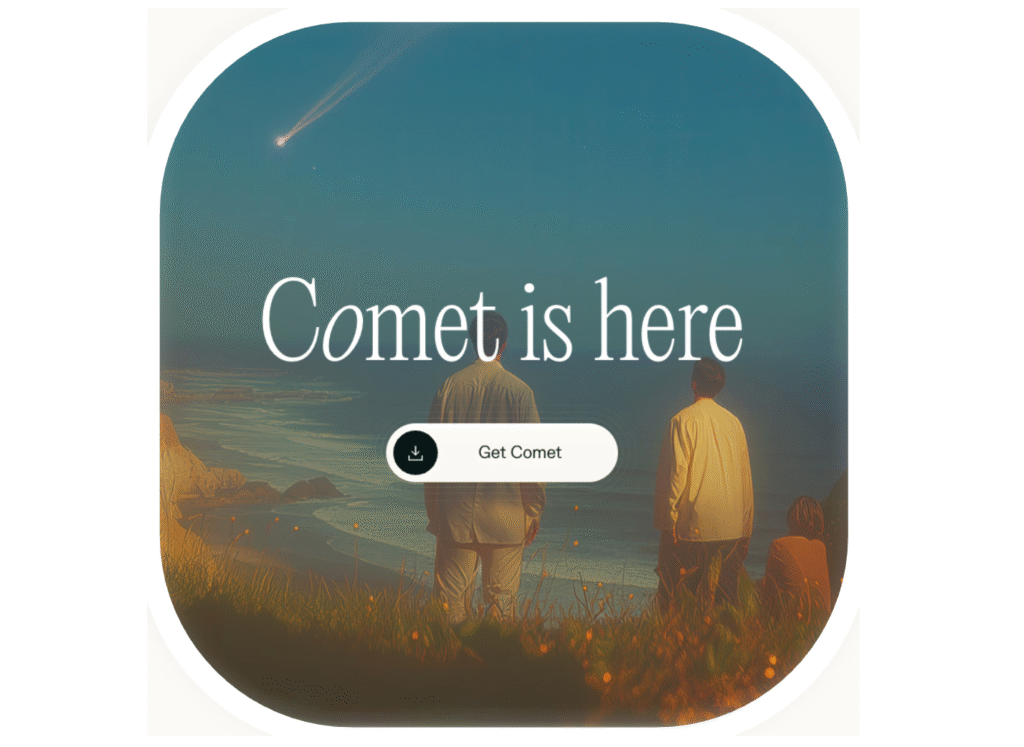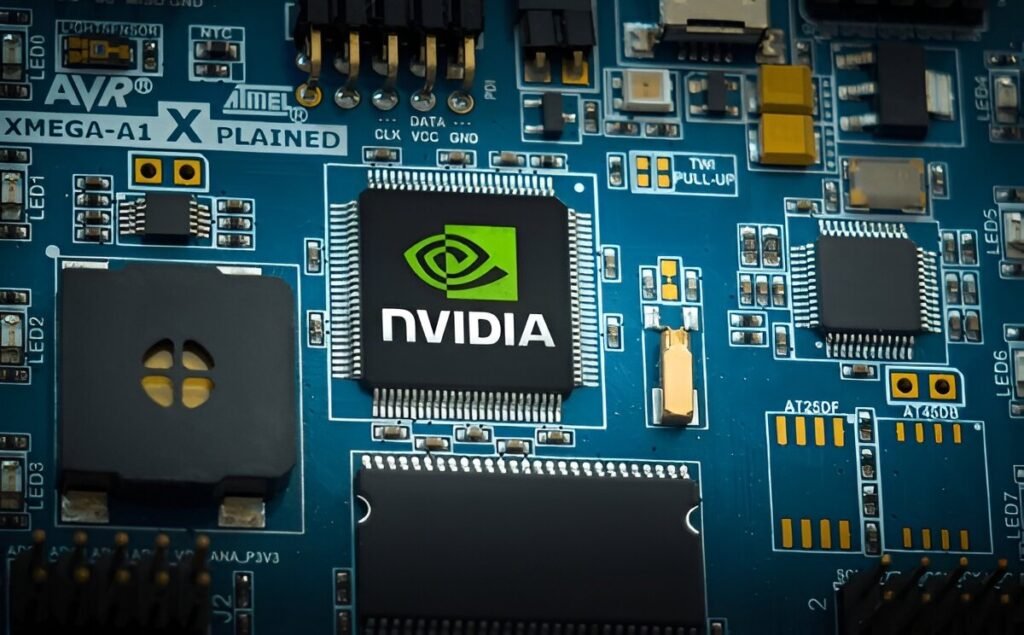Ever since the early days of Chrome and Firefox, web browsers like the new Comet Browser have been more about speed and stability than anything else. But things are starting to shift, and that shift is being powered by artificial intelligence. Suddenly, the browser is no longer just a window to the internet — it’s becoming a guide that helps you make sense of it.
That’s exactly why Comet Browser has been making waves. Built by Perplexity, a company already known for its AI-driven search engine, Comet takes the idea of browsing and flips it on its head. Instead of simply showing you links, it tries to understand what you’re looking for and brings answers directly into your workflow.
For anyone who spends hours a day online, this could be a game-changer. The promise isn’t just faster browsing; it’s smarter browsing. And if Comet delivers on that promise, it could challenge the dominance of Chrome, Safari, and even Google Search itself.
What Is Comet Browser and Why It Matters
At its core, Comet Web Browser is Perplexity’s answer to a question many of us didn’t know we were asking: what if your browser could think alongside you? Unlike traditional browsers that simply display websites, Comet layers artificial intelligence on top of every search, page, and query.
Perplexity designed Comet to work as more than just a tool for opening tabs. It’s built as an AI-first experience, with search and browsing deeply integrated. That means instead of typing a question into Google and clicking through endless results, you can get a concise, AI-generated answer directly in your browser.
This matters because browsing habits are changing. People want results faster, and they want context without the noise. With Comet, Perplexity isn’t just building another browser; it’s positioning itself as a direct rival to Chrome, Edge, and Safari — and maybe even to Google Search itself.
Key Features of Comet Browser
What makes Comet Browser stand out isn’t just its sleek interface — it’s the intelligence working behind the scenes. While most browsers focus on speed and compatibility, Comet builds AI into the very foundation of how you browse.
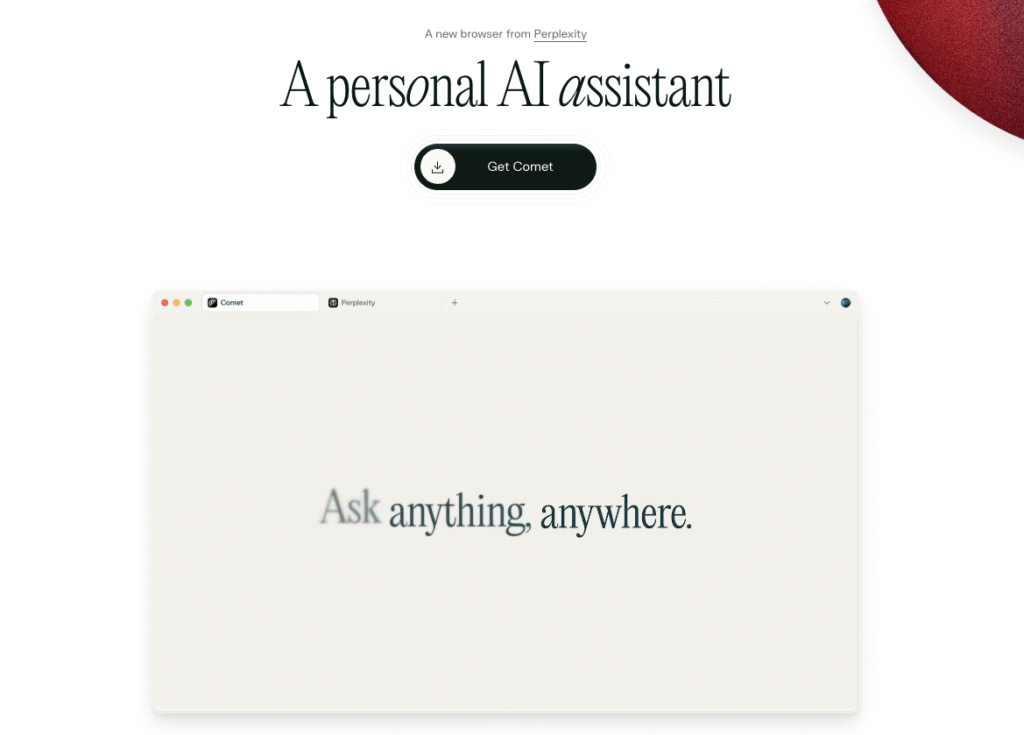
Here’s a quick look at what sets it apart compared to traditional browsers:
| Feature | Comet Browser | Traditional Browsers (Chrome, Edge, Firefox) |
|---|---|---|
| AI-Powered Search | Built-in Perplexity AI assistant | External search engines required |
| Speed & Performance | Optimized for fast results + AI speed | High performance but no AI acceleration |
| Privacy Tools | Enhanced AI-driven privacy filters | Standard privacy modes |
| Customization | AI-driven recommendations & workflows | Extensions-based personalization |
| Research Assistance | Summarized answers, citations, context | Manual searching across multiple sources |
Smarter Search with Built-in AI
One of Comet’s biggest selling points is its integration with Perplexity AI. Instead of bombarding you with a dozen search results, the browser gives you clear, contextual answers in seconds. It feels less like browsing and more like having a digital research assistant at your side.
Privacy and Customization Done Differently
Unlike Chrome or Edge, Comet doesn’t lean heavily on ads or tracking. Instead, it offers privacy-first browsing while still keeping personalization through AI-driven recommendations. You don’t need to dig through endless settings — the browser adapts to how you search and work.
With these features combined, Comet isn’t just another alternative browser. It’s trying to redefine what browsing should feel like in an AI-driven world.
Browser vs Traditional Browsers
Switching browsers can feel like changing houses — you notice every little difference. With Comet Browser, those differences go beyond design. Its AI-first approach changes how you search, read, and even think about information.
Speed and Everyday Performance
Traditional browsers like Chrome and Edge are optimized for loading websites quickly, and they do that well. Comet keeps up on speed but adds something extra: it processes queries through AI before showing results. That means less time wasted clicking through irrelevant links.
AI-Powered Browsing vs Link-Based Browsing
Here’s the biggest divide. Traditional browsers lean on search engines to provide links, while Comet brings direct answers and summaries into the browsing experience. Instead of sifting through tabs, you’re getting context instantly — which can make browsing feel smoother and more productive.
Privacy, Extensions, and Ecosystem
Chrome and Edge thrive because of their massive extension libraries and integration with Google or Microsoft services. Comet doesn’t have that depth yet. But it wins points with privacy features and AI-driven personalization that doesn’t rely on ad-heavy tracking. The trade-off is clear: a smarter browsing experience today, with fewer ecosystem tools than the giants.
Who Should Try Comet Browser
If you’re considering making the switch, here are the kinds of people who’ll likely benefit most from Comet Browser — and a few who might want to hang tight a bit longer.
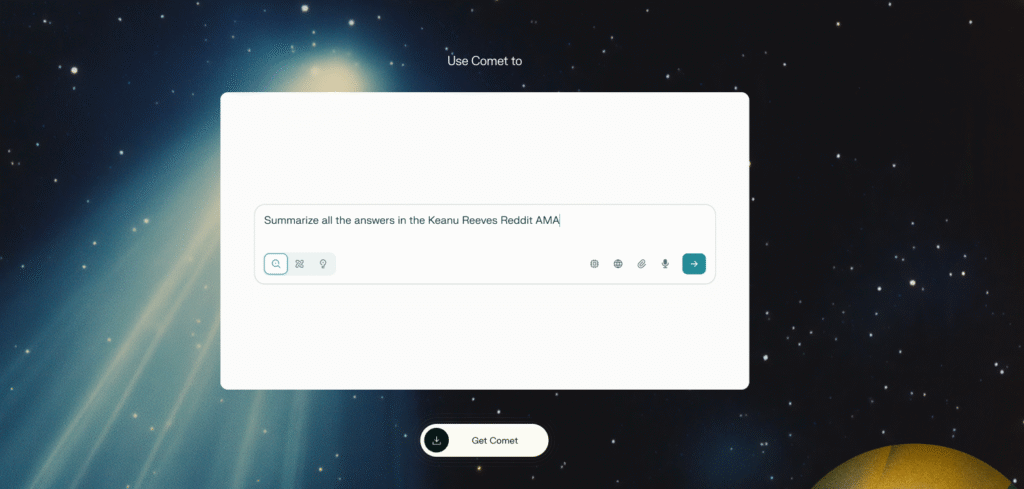
Everyday Users Who Want Smarter Browsing
If you’re someone who spends a lot of time hopping between tabs, doing searches, reading long articles, and trying to keep context in your head — Comet can help. With its built-in AI assistant, summarization tools, and contextual recommendations, you can see fewer unnecessary tabs and more direct answers. If speed plus clarity matters to you, this is one to try.
“A browser is much harder to replicate than just another chat tool. That said, I’m operating under the assumption that OpenAI will eventually build its own browser too, just like Anthropic.”
— Aravind Srinivas, Co-founder & CEO of Perplexity AI The Economic Times
Students, Researchers, and Professionals
If your work or studies involve digging through lots of information — comparing data, pulling together sources, writing reports — Comet could save you time. Instead of bouncing between search results, academic articles, and notes apps, you might be able to keep more of that flow going inside the browser. It helps especially when context switching slows you down.
Creators, Organizers & Power Users
For people who like to customize, automate, and optimize their setup, Comet offers interesting possibilities. From scheduling tasks to summarizing content and building workflows, power users will enjoy how Comet pulls together features that often require multiple extensions or apps. It’s particularly appealing if you’re willing to trade a bit of current extension/developer ecosystem maturity for something more integrated.
Limitations and What’s Missing
No browser is perfect, and Comet Browser is no exception. While it pushes the envelope with AI-powered browsing, there are still trade-offs and growing pains that early adopters should keep in mind.
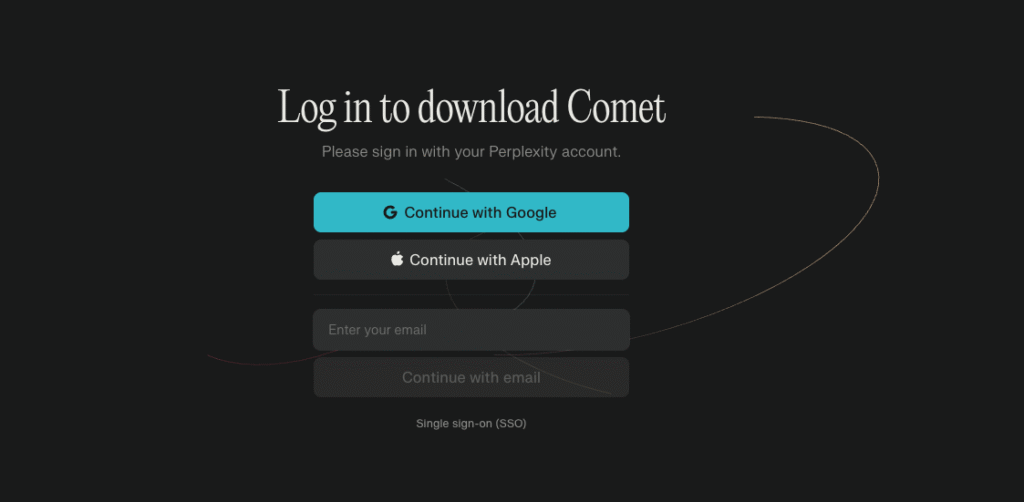
Comet Browser and Its Limited Extension Ecosystem
One of the biggest hurdles is the lack of a mature extension marketplace. Chrome and Firefox thrive because of the thousands of add-ons that make customization limitless. Comet doesn’t yet offer that depth, which can be frustrating for users who depend on extensions for productivity, password management, or workflow automation.
Comet Browser Isn’t Fully Mainstream Yet
Switching to Comet means you’re stepping away from the mainstream browser ecosystem. That can lead to occasional compatibility hiccups with certain websites, apps, or enterprise tools. While the core browsing experience is smooth, heavy users of Google Workspace or Microsoft Office online may run into rough edges.
AI Dependence and User Trust
Relying heavily on AI has its pros and cons. On one hand, you get instant answers. On the other, you sometimes risk shallow context or incomplete responses. For users who prefer digging deep into raw sources, this reliance on AI can feel limiting. And trust remains a question — especially when AI summarizes complex topics where accuracy is critical.
The Road Forward for Comet Browser
The future of Comet Browser depends on whether it can balance innovation with stability. Right now, it’s winning attention because it feels different — AI isn’t just an add-on; it’s built into the core experience. But to stay relevant, Comet will need to grow its ecosystem, attract developers, and keep performance competitive with the giants.
A big part of that future also ties into hardware. As AI models grow larger and more complex, browsers like Comet will need powerful back-end support. That’s where companies like NVIDIA, which designs the GPUs that fuel modern AI workloads, play a critical role. As Perplexity scales Comet, partnerships or optimizations with NVIDIA-powered infrastructure could make or break its ability to deliver fast, reliable AI-driven results.
Looking ahead, Comet has the potential to carve out a unique place in the browser market. It may never completely replace Chrome or Safari, but it could become the go-to option for people who want an AI-powered experience without relying solely on Google. If Perplexity can keep building momentum, supported by advances in AI hardware and cloud computing, Comet might just be the browser that redefines how we use the web.
